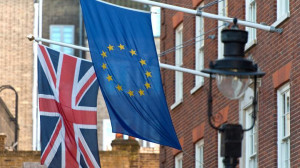
Beyond the chutzpa of the American president telling the Brits to stay in the Union – coming close to admitting that they constitute the US’s Trojan Horse – beyond Donald Trump’s applause, partly motivated by his own bottom line, or Hillary’s holier-than-thou assurance that she would prevent the Brexit from adversely affecting American ‘families’, the first really significant reaction came from Germany, which, as expected, announced that the world’s financial capital would move from ‘The City’ to Frankfurt.
Now, the only things that Frankfurt-am-Main and London-on-Thames have in common is that they are both dreary places where misfortune is cleverly generated for the many. But we can expect that once Frankfurt becomes the world financial center, money will feel freer to move Eastward, and Europe’s destiny with it.
That the Brits should turn out to be the first member to actually ditch a European Union barely recovered from fear of a Grexit, is really no surprise. For centuries, though separated only by a five-mile wide Channel, Great Britain has kept itself more aloof from ‘the continent’ than has the United States, an ocean away. The popular French saying ‘perfidious Albion’ is said to date back to the thirteenth century, meaning that it has had continuous meaning for Europeans over seven centuries.
From beyond the White Cliffs of Dover, England and its appendages, Wales, Scotland and the ever-troubled Ireland, have looked ‘over’ at the ‘continentals’ mainly with disdain, often with irritation at their ‘bloody ways’. Great Britain — a large island whose monarchs still occupy Windsor Palace — reached beyond Europe to take over North America, India and Australia, creating an improbable but nonetheless powerful Empire, while ‘petty Europe’ was too enmeshed in its rivalries to even dream of turning parts of the Third World into an extension of itself. France came closest with large areas of Africa, a few Caribbean and Pacific islands and Vietnam.
France will undoubtedly be the European country most affected by Britain’s retreat, as increasing numbers of desperate young men from Africa and the Middle East stake out pup tents under the Paris metro and along the coasts of Brittany and Normandy, determined somehow to make it to Britain. Not that a Brexit will make it any easier for Britain to avoid receiving them: volunteers keep watch along the Channel, but either by swimming or bribing fishermen, some will get across, as the two countries are unlikely to better coordinate their policies than they have been as part of one entity.
Britain’s historical aloofness from the continent did not subside with her joining the European project almost twenty years after the historical rapprochement between France and Germany in 1955. On the contrary, and most famously under the eleven year (1979-1990) premiership of Margaret Thatcher, it constantly demanded, and obtained, special conditions from its European partners, paying less in and taking more out of the arrangement than others. It is therefore no surprise that as as turmoil in Africa and the Middle East continues to build, Britain should take her marbles and go home to find a uniquely British way of dealing with the fall-out from a world it once owned.
The retreat of Washington’s Trojan Horse will leave Europe free of American oversight for the first time since 1945. France and Germany will be the undisputed leaders of a Europe free at last to disentangle itself from an over-weaning military and economic alliance and cease to be Eurasia’s ever-agitated tail.
Deena Stryker is an international expert, author and journalist that has been at the forefront of international politics for over thirty years, exlusively for the online journal “New Eastern Outlook.”
